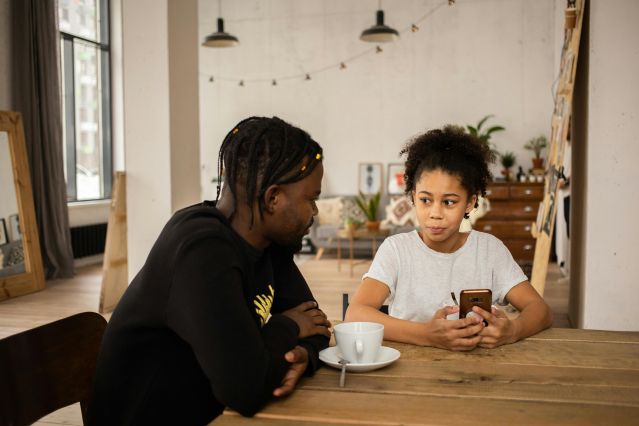Social Media
How to Talk to Your Children About Social Media
Evidence-based ideas and resources to protect kids' mental health.
Posted September 4, 2024 Reviewed by Tyler Woods
Key points
- There is a direct link between the use of social media and mental health risk.
- Parents can play a crucial role in protecting their children's mental health by collaborating with them.
- There are evidence-based approaches to help parents talk with kids about difficult problems like social media.
- Listening hard to kids' perspectives is critical and opens the door to shared concern and problem solving.

We are in the midst of a massive youth mental health crisis. The numbers tell a sobering story: Nearly three-quarters of parents say they are worried about their children struggling with anxiety or depression.
Psychologist John Haidt and others have made strong cases for the parallels between the rise of mental illness in America’s youth and the rise of social media. Proposed solutions range from “take the phones away” to “encourage free play” and “fight social media companies, like Meta and TikTok, with litigation and new laws.”
Most recently, our Surgeon General called for a warning label on all social media platforms. While pediatricians, parents, mental health professionals, and lawmakers advocate for controls and legislation to protect our children, as parents, we are left wondering what we should do with our pressing concerns and fears about social media’s impact on our kids. We are left to tackle the problem as best we can on our own, and we need to take action now.
The Advice
One clear piece of advice to all parents is that we should be talking to kids about the dangers of social media and its impact on mental health. The big question is, how do we do that effectively? Too often, those conversations devolve into attempts to convince our kids of the risks and the need to curtail use, which they tolerate at best while frequently tuning out. At worst, these conversations lead to stress and conflict we want to avoid. We can do better than just talking to our kids. We can collaborate with them on win-win solutions that safeguard their mental health.
Many psychologists have good ideas about how to talk to kids. Still, the topic of social media is particularly fraught, as it involves everything from grades to social and family life, body image, bullying, abuse, commercialism, and addiction—all in an arena where kids have legitimate concerns about whether parents can truly understand and appreciate the online world they navigate.
A Proven Approach
I have spent the last 30 years helping thousands of adults have difficult conversations with kids, even when those kids have significant challenges with skills involved in problem-solving, expressing their concerns, understanding others’ perspectives, regulating their emotions, flexible thinking, and impulse control, to name a few.
Our research in our program in the Department of Psychiatry at Massachusetts General Hospital has shown that we can collaborate effectively with our kids even in the toughest situations. We need to apply evidence-based parenting approaches, like our Collaborative Problem Solving approach, to the enormous problem of social media’s highjacking of our kids’ childhood. We don’t have time to waste. The stakes are too high.
This is why we, in partnership with Your Brain on Social Media, have created a free tool for caregivers that helps them plan for, and have productive conversations about using social media. If we are going to help reverse spiraling trends of disconnection, we should use proven strategies to talk with kids about social media. Collaborative Problem Solving teaches parents to include kids in developing win-win solutions, and it also trains adults to be specific about what problems are being caused by social media. It helps us listen to our kids first before presenting issues and devising ways to solve them. It highlights areas of shared concern and allows for mutually agreeable personalized solutions. There is incredible power in collaborating with our youth.
Listen First!
The first lesson I’ve learned when talking to kids about social media concerns is that most are not only aware of the issues but actually share their parents' concerns. If we can surface and really listen to our kids’ concerns before sharing ours, it opens the door to collaboration rather than lecturing or attempts to impose our will. If we can share concerns rather than our solutions, we can work with, not against, our kids to problem-solve together.
This is not to say that our kids might not have some different concerns or perspectives than we do, but hearing them out still provides an opportunity for us to learn and opens the door to collaboration while building a trusting relationship.
In your first conversation with your child about social media, set out to be curious, not judgmental. Simply try to gather information about their perspective without worrying about sharing yours. How? Here is what I’ve learned from studying difficult conversations. As parents, we can be good detectives by sticking to these four things:
- Asking open-ended questions
- Taking educated guesses, if need be
- Reflecting back in our own words what we hear from our kids
- Reassuring them that we really want to listen and learn, that they aren’t in trouble, and we aren’t trying to make them do what we want
Share Your Concerns, Not Your Solutions, and Invite Collaboration
Only once we really understand their perspective should we share ours, highlighting areas of agreement before inviting our kids to brainstorm potential solutions to both our concerns together. Solutions must address our kids’ perspectives as well as our own. Inviting collaboration aimed at generating mutually satisfactory solutions makes our kids co-authors of the solutions, increasing their buy-in and follow-through. This evidence-based process has been proven to address challenging situations, improve relationships, and build skills along the way, while getting high ratings from kids who appreciate this way of handling problems together.
As we attempt to listen with an open mind, it is important to acknowledge the positive role that social media can play when used in moderation for specific purposes. Our kids sometimes use social media to connect with friends, to create a sense of belonging when they feel marginalized and alone, and even as coping strategies to help them manage mental health symptoms such as anxiety.
When we limit or take away social media, we must be careful to replace it with something that serves these purposes as well or better. These are even more reasons to make sure our kids’ perspectives are on the table when creating solutions together, lest we take away something helpful in some capacity and damage trust with our kids.
So, what happens when you come up with some mutually agreed-upon solution with your child, and they don’t adhere to it? I’m often asked what the consequence should be. A punishment would only re-establish an adversarial relationship with our kids, who aren’t the problem in the first place. The algorithms that encourage compulsive use are. The consequence should be going back to the drawing board to work hard together to reach a more realistic and feasible solution. Is this process hard work? Yes. Magic? Of course not. But big problems require hard work, and our kids’ mental health depends on it.




